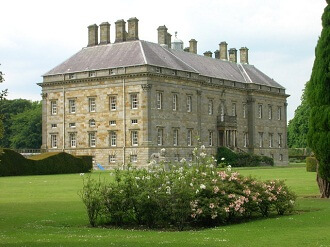Future Gay Partners of Descendants to be Given the Same Rights as Heterosexual Spouses
Future Gay Partners of Descendants to be Given the Same Rights as Heterosexual Spouses

A landed family has rewritten the inheritance rules of a trust to give any future gay partners of descendants the same rights as heterosexual spouses.
The Pemberton family, which owns Trumpington Hall in Cambridgeshire, is believed to have become the first landed gentry to change the inheritance rules of a trust to allow an estate to pass on to the partners of gay descendants.
They say they “owe a moral obligation” to future generations to grant the same rights to civil partners and same-sex spouses.
Richard Pemberton won approval for the changes at the High Court. Lawyers for the family told Judge Hodge that the changes would bring “a huge moral benefit” to future generations.
Mr Pemberton and his wife Helen have two daughters, aged 14 and 12, and a 10-year-old son.
The High Court was told that lawyers for the family had considered the “financial, ethical and moral issues which can arise with settlements relating to substantial family wealth” and had come up with proposed changes to the family trust.
An extension of the definition of spouse
One of those changes was the “extension of the definition of spouse” in regard to inheritance rights over the property to include “any civil partner or spouse in a same sex marriage”.
Under the amended trust, future gay partners would have a life interest in the estate following the deaths of their spouses. Judge Hodge said: “These classes of beneficiary will be included after the variation, although there is no beneficiary of those classes in existence at this time.”
Should siblings be able to become civil partners to avoid tax?
A historian and Conservative peer has suggested that siblings should be able to form civil partnerships in order to avoid inheritance tax.
Lord Lexden proposed the idea in a question in the House of Lords, saying: “Is it not the case that in Britain today all other stable and loving couples are now able to formalise their relationships in legal terms — so vital for inheritance and its tax implications? If sibling couples are to be denied civil partnerships, how does the Government propose to address the injustice that will arise on the death of one of them, with the survivor having to sell the family home to pay inheritance tax, from which civil partners are exempt?”
Lord Lexden’s question was replied to by Baroness Williams of Trafford, for the Department for Communities and Local Government, who said: “The Government [has] no plans to amend the Civil Partnership Act 2004 to enable siblings to register as civil partners. Civil partnerships are the equivalent of a marriage: a loving union. They were created to enable same-sex couples to obtain legal recognition of their relationship at a time when marriage was not possible for them.”
Not the first time the issue has been raised
In 2006, lawyers for two elderly sisters told the European Court of Human Rights that inheritance tax concessions discriminated against some heterosexual couples.
Joyce Burden, 88, and her sister Sybil, 81, claimed that they should enjoy the same tax advantages as a lesbian couple.
The sisters looked after their parents and two aunts at their home near Marlborough, in Wiltshire, until their deaths. They argued that because their main asset was the family home which had previously belonged to their parents, and in which they then both lived, if one of them died the property would have to be sold to settle the tax bill.
Their legal efforts to become recognised as partners eventually failed.
Another opposite-sex couple’s bid to have a civil partnership was rejected by the High Court earlier this year. Sisters Catherine and Ginda Utley have spent most of their lives together, and neither are married. After Catherine became pregnant in 1993, Ginda helped raise her daughter. Despite living as one family unit, the sisters say they have been left without any legal protection. Catherine Utley has called for the system to be re-purposed to allow for relatives to form non-romantic civil partnerships – which are currently blocked by incest regulations in marriage laws.
Dominic Grieve, the former Attorney General and a supporter of the sisters’ cause, said: “The exclusion of cohabiting blood relations from the right to form [a civil partnership] is discriminatory and a serious mistake that needs to be corrected.”
Buckinghamshire’s wills and trusts legal experts
If you still haven’t finalised your last wishes or would like to write a new will, want to leave money in trust for a relative, or are struggling with probate issues, please call our experienced solicitors on 01494 790002. Alternatively, email us at estatemanagement@ibblaw.co.uk.
